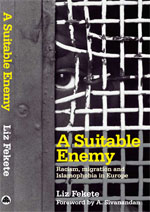Book Review: A suitable enemy: Racism, migration and Islamophobia in Europe, by Liz Fekete
Article published: Thursday, September 24th 2009
As the English Defence League plan anti-Muslim demonstrations in Manchester this October, Frances Webber reviews Liz Fekete’s account of the rise of Islamophobia.
 For most of her adult life, Liz Fekete, now the executive director of the Institute of Race Relations, has been fighting racism. And in order to do so effectively, she has sought to understand the changing forms of racism, and to educating other people about them. A large part of her work is debunking the complacent myths particularly prevalent among middle-class self-styled leftists, that we are somehow in a post-racist society, that racism isn’t something which needs to be taken seriously, that the battles have all been won.
For most of her adult life, Liz Fekete, now the executive director of the Institute of Race Relations, has been fighting racism. And in order to do so effectively, she has sought to understand the changing forms of racism, and to educating other people about them. A large part of her work is debunking the complacent myths particularly prevalent among middle-class self-styled leftists, that we are somehow in a post-racist society, that racism isn’t something which needs to be taken seriously, that the battles have all been won.
This book is her tour de force, where she pulls together the threads to demonstrate how dangerous such complacency is. With the global financial crisis and the widespread loss of faith in the ability of the democratic parties of the mainstream to protect the interests of working people, it could not be more timely. As troubling as the electoral success of the BNP is, the threat is not so much the election of an extreme right-wing government. It is, as Fekete shows, the continuing incorporation by governments all over Europe of more and more of the extreme Right parties’ nationalist and anti-immigration policies to gain and retain popular support as the media constantly stokes popular racism.
The book’s scope is extraordinary, both geographically – ranging from Scandinavia to the Mediterranean – and topically, linking themes of global migration management, xeno-racism against poor Roma from eastern Europe, the development of the European security state, anti-Muslim racism and mono-culturalism, target-driven deportations, the treatment of child asylum seekers and the growth of solidarity movements.
The main theme is how anti-immigrant racism and anti-Muslim racism have come together in the past decade and a half to exclude poor foreigners and Muslims from the basic rights and benefits of European society. The book traces the growth in the 1990s of ‘globalised racism’ (which imposes strict controls on people to protect the freedom of capital), showing how dehumanising policies were developed to protect western Europe from asylum seekers, whose poverty marked them out as the ‘enemy’. They were dispersed, detained, contained and quarantined. Then, the ‘war on terror’ added anti-Muslim racism, as the EU developed a parallel security state, with hugely intrusive surveillance, religious profiling and a vastly increased role for the intelligence services. Member states retreated from multi-culturalism into a stridently anti-Muslim public discourse.
In the section on ‘enlightened fundamentalism’, Fekete demonstrates the profoundly hypocritical use of ‘enlightenment values’ to repress Muslims, and to restrict or deny migration and settlement rights. She also here and examines the changing nature of citizenship, which can now be removed at will from those deemed ‘undesirable’. In the section on detention and deportation, she describes the warehousing of rejected asylum seekers in privatised detention centres, the co-option of north African states into the carceral process, the target-driven deportation policies which bear disproportionately on the most vulnerable – families with children and the sick – as the easiest to deport. This part of the story includes the secret deportation charter flights, the lack of transparency and due process and the deals with torturing states which mark national security deportations. And in the final section, ‘the fight for civil rights’, after looking at the way children are stripped of their childhood in detention centres and return programmes, or demonised as criminals, she turns to the solidarity movements which have sprung up to defend people, particularly children, from these inhuman processes.
In the last chapter, she describes the contribution of Muslims who reject their characterisation as ‘the problem’ by media and government, joining campaigns against the war in Iraq and Palestine, building civil rights and self-help movements and creating new inter-racial alliances to restore enlightened values and to ensure that they are truly universal in their application.
Illuminating the issues and enlightening readers confused by the contradictions of the liberal press, this book is an essential tool for understanding contemporary racism and a demonstration of how necessary the fight against racism is for the full realisation of human rights.
More: Culture, Exhibition
Comments
-
Great to know that a fellow Hungarian woman (or at least a woman with a Hungarian surname) wrote this book. And her surname, “Fekete” means “Black” in English. On the basis of the review this book looks extremely interesting and thorough. Piri
Comment by Piroska Markus on September 24, 2009 at 9:25 pm -
Thanks for this review, the book is really excellent – as to be expected from Liz Fekete
Comment by James F on October 8, 2009 at 5:26 am
The comments are closed.



